[This story was co-written by Elly Blue and Jonathan Maus]
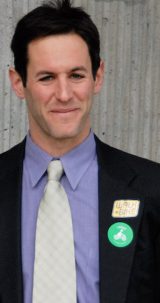
(Photos © J. Maus)
Last week the Board of Directors of the Bicycle Transportation Alliance (BTA) — Oregon’s largest bicycle advocacy organization — fired Scott Bricker after he served just two years as the organization’s executive director.
“What’s going on down there?” we were asked by David Hiller, advocacy director of the Cascade Bicycle Club, the BTA’s Washington State counterpart. “The whole national advocacy community is all atwitter about this and there aren’t any answers.”
Hiller’s sentiments were echoed here in the BTA’s own backyard, where many seemed to be caught off guard by the decision, which was effective immediately.
“Portland is at the forefront of bicycling, but we’ve stalled.”
— Mary Roberts, BTA Board Chair
But for those close to the BTA, Bricker’s departure was just the latest episode in a period of transition that has been underway at the organization for some time.
When Bricker took the reins of executive director in October of 2007 — a position he had referred to as his “dream job” just a few months prior — he had been with the BTA since 1998. But being the leader of a large and mature non-profit was something new to Bricker. “The learning curve was steep,” he told us in a recent interview.
Making that curve steeper, was the pressure (by himself and his Board) to right a ship that has been slowly drifting off course for years. Bricker replaced a former executive director, Evan Manvel, who left the organization after a similarly short tenure (two years) marked by mixed accomplishments.
Bricker immediately set his sights on sweeping changes. At the time of his hire, BikePortland interviewed Bricker and reported that he wanted to bring about an “evolution” at the BTA. “I’m looking to re-structure the entire organization,” he told us.
This he achieved, but not without casualties — including his own job. Bricker was the eighth staff member to be let go by the BTA in the 2009 calendar year. Job descriptions and reporting changed for most remaining employees, and new hires came with a new organizational structure. Furthermore, the news of his departure came in the wake of revelations that the organization was pulling itself out of a hole caused by inadequate accounting and financial oversight in 2008.
But greater than any structural difficulties, and with roots that go beyond Bricker’s tenure, has been a growing sense that the organization has lost touch with its vision and its membership, and that it has not kept pace with Portland’s bicycling boom. Moreover, complaints have grown that the BTA has been absent from advocacy outside of Portland.
Board Chair Mary Roberts, in an interview after Bricker’s departure, said that it has been about a year since she first began to get a sense that the BTA had lost its way. “Portland is at the forefront of bicycling,” she said, “but we’ve stalled.”
Roberts cited September’s event with David Byrne, widely criticized for its self-congratulatory tone, as a moment of clarity. “I literally sat there and thought to myself, I am embarrassed,” she said. “If that’s where we’re focused, that’s a problem. It was so in my face at that moment.”
“It’s begun to dawn on me that we’ve begun to become complacent, and that we are satisfied with very little funding, and that if we’re serious about bicycling being a serious mode of transportation we can’t just make a gesture….in order to make this real we can’t just settle for crumbs. There’s no one at fault here in this, it’s just something that we get used to.”
Others close to the BTA have also spoken of a growing sense of lost direction. This sense has in part been influenced by changes in the makeup of the Board of Directors in the last two years that brought in fresh perspectives and a wealth of business experience. The results have been eye-opening, said Roberts. Board member and former Nike executive Stephen Gomez initiated a “rebranding” process earlier this year, which has led to a closer look at the BTA’s communications efforts — and, in the bigger picture, its vision.
“Definitely, that vision piece went into the ED decision,” said Roberts, adding that “It’s been a process, a growing realization that we need to reorient the organization and move into the next era, and that definitely led into the ED decision.”
Bricker may not be the one Roberts and her Board colleagues want at the helm of the BTA in the new era to come, but his contributions to the organization over the past decade have been immense.
BTA board member Doug Parrow, who worked closely with Bricker for many years on the BTA’s legislative efforts, said, “Scott’s real strength, I think, was his ability to work within that state legislative structure.” Parrow indicated that the BTA’s legislative approach and goals will be shaped for many years to come by Bricker’s legacy.
Another of Bricker’s strong points has been program work, particularly youth education. He began at the BTA with the former iteration of their Safe Routes to School program, and brought the Safe Routes national conference to Portland this year. Under his tenure, the program flourished, and youth education became solidified as a pillar of the BTA, making up about a third of the organization’s staff and budget.
Safe Routes to School and the halls of the capitol were in Bricker’s comfort zone; but as the leader of a 5,000 member non-profit with 15 full-time staff and an annual budget well over $1 million, he was expected to excel on many other fronts as well.
A seasoned back-room negotiator as a lobbyist, Bricker brought that style with him as executive director. This proved effective in some cases, but in others it resulted in a confused and unsupportive public. Under his leadership, the BTA sometimes struggled to present clear positions on high-profile issues.
Last November we learned that the BTA supported a statewide point-of-sale bicycle excise tax as a way to raise money for bicycle infrastructure and their Safe Routes to Schools program. The BTA explained their support of a bike tax as being a “political reality,” but many in the community felt it was the wrong conversation to be having.
Several months later, Karl Rohde, the BTA’s Government Relations and Public Affairs Director, was abruptly fired right in the midst of the busy legislative session (Bricker hired Rohde less than two weeks after being named interim executive director). Rohde was hired to “raise the political savvy” of the BTA and his addition was a key part of Bricker’s re-structuring effort.
The reason for Rohde’s firing was never made public, but his absence must have had an impact on a disappointing legislative session which saw no significant gains for bicycle transportation. Rohde’s main legislative effort revolved around the Idaho Stop Law, which failed just 2 1/2 weeks after his departure.
The Columbia River Crossing project was perhaps Bricker’s most challenging policy issue. In an interview about it in May 2008, Bricker told us:
“Moreso than any other project I can think of, this project has had the most divergent set of opinions within the BTA in a long time… We are still having a hard time stating our positions.”
The BTA’s initial support of the CRC project drew scorn from some of their most active members. Even after issuing a position statement on the project in June 2008, the BTA continued to hear criticisms from members and the community. Attempting to answer those concerns, Bricker wrote a blog post to clarify their stance and even strengthened their tone against the project a few weeks later.
However, after Portland Mayor Sam Adams supported a 12-lane bridge option, the BTA again stopped short of criticizing the Mayor. When asked directly where they stood on the project, Bricker maintained his poker face, saying “12 lanes is just a number.”
One month later the BTA got tougher on the CRC, and finally — after nearly all the wheels had fallen off the controversial and increasingly unpopular project — they walked away from it altogether back in August.
As these messy policy debates played out in public, Bricker also struggled, he said in our discussion in August, to overcome his lack of management experience. It took him a year to begin to make the staffing changes he had immediately seen the need for, he said, in part because of reluctance to break up a longstanding team.
He helped to bring more business people onto the board; and this new board in turn, according to Roberts, demanded that the BTA increase its professionalism and financial transparency. This demand appears to have set off some of the tumultuous staffing changes of the past year.
Mia Birk, principal of Alta Planning and Design and long time insider on the local bike scene, said of Bricker’s departure:
“It’s ironic because he cleaned house, he brought in a new board, and I think it’s a compliment to Scott on a lot of levels that he took them to this place… He has something in him where he is humble enough to pick his own bosses that were more forceful than him. And the price he pays is that they turn around and say: ‘We need someone that can go toe-to-toe with us. You’re too sweet, we like you, but you don’t have the kind of leadership strengths we’re looking for.'”
Instead of hiring an interim director, the board chose to ask the BTA’s remaining directors to work with them to keep the organization running until a new ED can be hired. Angela Koch, who had been Bricker’s second-in-command as operations and communication director, said that the team is “…maintaining daily operations and making sure we’re still present in all of the initiatives we have going on. But in terms of any sort of broad shift — there’s not going to be any major change while we don’t have an ED.”
The board aims to hire a new director by March, 2010, Roberts said.
The BTA’s search for leadership and an identity comes at a pivotal time in Portland’s bike history: A monumental bicycle plan is on the home stretch to adoption and bicycling has support on all levels of government. In the meantime, the community is growing impatient with the status quo and has high expectations for its largest advocacy group.
For the BTA, the challenges ahead are numerous. To succeed, it will take more bold moves and the right balance of partnership and pressure needed to galvanize a community movement that’s just waiting to coalesce around a strong and focused leader.
Bricker has not yet responded to a call for comment.



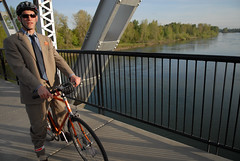
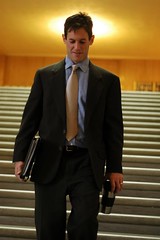


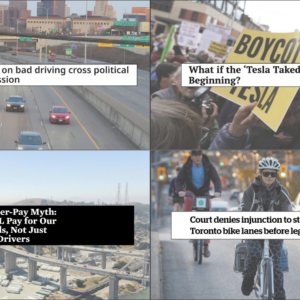
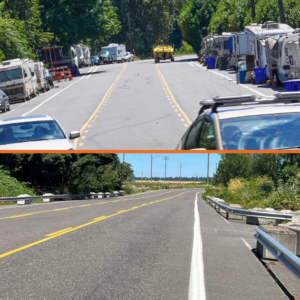
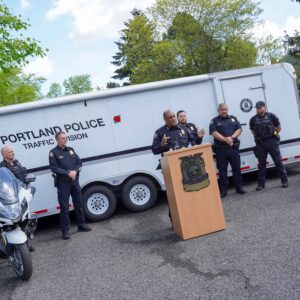

Thanks for reading.
BikePortland has served this community with independent community journalism since 2005. We rely on subscriptions from readers like you to survive. Your financial support is vital in keeping this valuable resource alive and well.
Please subscribe today to strengthen and expand our work.
Great analysis, thanks!
But was a BTA rep present or featured at that David Byrne event that apparently pushed Roberts over the edge? I’ll admit that I stopped following the BTA ever since Evan Manvel was at the helm, but I doubt that “complacent” would be the right word to describe them.
great work, Elly and Jon. as a dues paying member of BTA, I am concerned that the organization’s bylaws are not posted to their site, and apparently their board meetings are not open. what input do members really have?
Some of your best journalism to date. Thanks bikeportland. I’m excited to hear your analysis of how the BTA moves forward, especially in regard to new visioning, the CRC project, and shaping the state’s bike future.
I came here just after laughing my way through a great BikesnobNYC posting in which he mentions, for the umpteenth time, Portland’s smugness when it comes to all things bike. Is this the self-congratulatory and complacent attitude that Mary Roberts speaks of? A sense that “Were Platinum / #1 in the USA – we’ve arrived!”?
Or was the last legislative session in Salem a crushing loss for BTA and perhaps Bricker was only going through the motions in the board’s minds?
hmmm…it’s pretty rare that an organization “fires” somebody in a position like this without already having a replacement in mind. I have a hunch…
Never donated, never will. They presume to be the voice of Portland cyclists, but they can’t even manage a non-profit.
“It’s begun to dawn on me that we’ve begun to become complacent, and that we are satisfied with very little funding…”
From Bikeportland Oct. 2009
“The BTA’s total revenue for the year was $1,376,577. This number is up from $1,102,734 the year before, and has nearly tripled since 2004.”
I’ve always considered the BTA to be like OSPIRG, Political petitioners, and aggressive religious groups. Making a lot of noise and money while flailing on the periphery.
From the comments I remember regarding the David Byrne event, it was Timo Forsberg, representing the City, Sam Adams, etc. who wouldn’t stop patting himself on the back. “World Class amenities”!!!! Yay.
I would speculate that the BTA has always been hard at work regardless of any previous accomplishments, but their efforts were perhaps not focused on the right goals.
According to their site, there is an annual meeting on Dec 15 which members are invited to attend.
http://www.bta4bikes.org/btablog/2009/11/16/tuesday-december-15-bta-annual-meeting-in-portland/
For my membership dollars/volunteer hours, if they did nothing more than manage the Bicycle Safety Education program, BTA would still be a very important and relevant advocacy organization.
Not a fan #7, I’m pretty sure that the Mary Roberts quote “we’re satisfied with very little funding” refers to funding for bicycle transportation compared to transportation spending as a whole, not the BTA’s own revenue. Jonathan/Elly can you clarify?
I don’t think the BTA’s financial status (past errors notwithstanding) is the key issue at hand here.
When Roberts was discussing funding, and settling for crumbs, I believe she meant bicycle funding in general and not the BTA budget. It sounds like part of her hope for a new era is that the BTA will become a very strong voice for increasing the funding allocated for bicycle infrastructure.
I believe she was also speaking about the broader scope of Portland’s bicycling scene when she talked about the Byrne event as well.
Great article Jonathan/Elly. When do we hear from Scott himself?
Thanks, Ethan. Scott did not respond to our request for comment.
I think Scott is on a long-planned family vacation right now, which probably explains why he hasn’t responded to a call for comments.
Excellent article. Thank you for reporting this perspecitve.
I have felt, as many others have expressed, that the BTA has been, at best, marginally effective over the past decade. This is not to say they haven’t had some important wins. But there are numerous other issues where they should have been influencial but were not.
Maybe we actually need two different organizations.
One would be a BTA that is truly a statewide organization, that lobbies the legislature, that champions Safe Routes statewide, that is the go-to group for local bicycle issues.
But perhaps Portland also needs an independent group to focus on general transportation issues specific to Portland, with major focus on improving the bicycle and pedestrian environment. Maybe this is the sort of organization that Jonathan was thinking about when he posted a comment to an article about whether a transportation advocacy group wouldn’t be more effective if it wasn’t specifically bicycle oriented. (Pardon me, Jonathan, if my representation of your comment is inaccurate.)
I agree with Doug Parrow’s comment about Scott’s strength – being his ability to work within that state legislative structure. I have often wondered why the BTA has not made a full time position for lobbying regionally and nationally – separate from the ED. It would be tough having to concentrate on those tasks and continue to steer the ship at the same time. It might have been tough, but I feel like the BTA could have offered Scott to continue his work in the legislature as a new position for the BTA and step down as ED. It seems like Scott created significant connections and momentum in the legislative structure. Has this work been lost? Thrown away? Maybe they do have a separate position that I am not aware of. I’m still learning about all this and I’m short on facts. Just wondering.
Sorry, what does “ED” stand for?
ED = Executive Director.
It’s generally rare in nonprofits for someone to go from being a director to being staff. Imagine how awkward it would be for everyone — the former director, their new boss, and all the staff.
Ah… Executive Director, got it.
It seems the whole effort in this city to make cycling a larger part of people’s travel choices is reaching a critical moment in its trajectory.
There are enough people on bikes now, and enough infrastructure built, that it’s more than a blip on the radar screen. You can SEE 6% of Portlanders riding to work daily. It’s very noticeable. So yeah, yea us! Go Portland!
But we’ve picked the low-hanging fruit, which was easy because no one really noticed while we were doing it. Not so anymore. The next evolutionary steps will be painful and dramatic. The BTA, if it is going to continue to be a relevant organization, needs to position itself as a impassioned, yet reasonable partner in order to garner public support and encourage non-cyclists to get out of the car and onto the bike. But, simply trying to play ball with the big boys – as witnessed in the CRC fiasco – won’t cut it either. It’s going to require some highly sophisticated skills on the part of the new ED and staff to get us there.
Scott is a great guy. Maybe he wasn’t the best person to take the BTA into the next phase of its existence, but he’s done a lot for cycling in this town and he deserves kudos for that.
So I just read this article and I don’t know why this guy was fired.
Was it the Idaho Stop Law? I don’t think you can blame a ridiculous law not getting passed on the BTA.
CRC? Again asking the BTA to take on a philosophical stand against the CRC is foolhardy and depleted what political capital the bicycle lobby had in the first place.
Nice factual article, but it didn’t answer the big question on everyone’s minds.
clipless 9, I don’t think an annual meeting is nearly the same as allowing members to sit in on monthly (or however frequent, we don’t even know that) board meetings. are the bylaws posted to their website? I can’t find them.
Excellent reporting, Elly and Jonathan.
BTA’s response to Columbia River Crossing was dreadful, as everyone concedes. Perhaps Scott’s political acumen, his very strength, led him astray.
I stayed away from CRC, for many others had trained more than adequate criticism upon it. But I did keep up on other projected bridges, first being the ill-starred proposal to re-purpose the old span at Sauvie Island to Flanders and Interstate 405 for bicycles and pedestrians. At City Council Rick Potestio brought serious technical objections, and I got into a heated discussion (ok, a fight, for which I apologize) in the lobby, with Scott, also on technical problems. He and Sam Adams, the project’s chief sponsor, seemed oblivious to such difficulties.
Scott and Sam, skilled in politics both, had not considered that technical exigencies existed. But the science of physics and the art of structural engineering are remarkably unresponsive to political persuasion.
In years spent stagehanding I discovered my role in the economy of the universe: making others look good! It is frustrating and annoying when promoters and actors one wants to help exclude the very acolytes they require, systematically. Sam and Scott share a glaring weakness: they are political only.
The beat goes on. Why is the current design for a replacement bridge at Sellwood four times more costly than the original proposal? With thirty-seven feet allotted to bicycles and pedestrians it is effectively a four-lane bridge, five on the west end! The $200 million plus it is over budget could do a whole lot of good elsewhere. No one, including the Bicycle Transportation Alliance, seems to care.
There are two grave dangers in a social-service non-profit’s becoming overly political: introversion and exclusion. Give us locals who want to help opportunity to do so, Mary Roberts, and BTA can right its ship, surely.
are #22:
Don’t ask me, ask the BTA. I’d like to see their bylaws too. I pointed to their meeting announcement because I bumped into it on their site and thought some people reading this site might want to attend and give input about the org’s direction. I’ll be there expressing my view on what they should do with my membership dollars.
Not a Fan #7:
“They presume to be the voice of Portland cyclists, but they can’t even manage a non-profit.”
Managing any organization, especially a rapidly growing one with a $1.4M budget is certainly no easy job. To clarify; Not-for-Profit does not mean there is no money involved in its operation, nor does it mean BTA keeps $1.4M in the bank or that their employees take home big money. In fact, running a non-profit is probably more difficult in that it lacks the flexibility of a private entity. That said, it seems to me this leadership change is a good sign that they are holding people accountable and striving to improve.
I am sure they presume to represent their members first but If you had money or time to support a local/regional/national cycling advocacy group, to whom would you give it?
The Community Cycling Center hired it’s present Executive Director from outside the core of CCC candidates, that had applied. I think that’s what has helped them become the successful organization that they are, fresh ideas.
That’s what the BTA a board should do too, hire some new blood.
About a year ago I sat with Scott for an hour talking about BTA stuff, bike lights, helmets, fund-raising and the like. When we were done exploring various opportunities, I looked over and realized he wasn’t going to get out of his chair and do any of it and I was right. I thought he was a little too comfortable in the job.
I wrote him an Email a week before the firing, re-expressing some things we had talked about, he never wrote back.
I wish him and the BTA good luck.
as usual, an excellent write-up.
outsider’s perspective, here (SF):
fired Scott Bricker
i don’t like the idea that *anyone* gets fired from any organization unless they’ve done something really egregious, but it’s especially appalling that a non-profit does it, and worse still that a bike non-profit does it. if Bricker canned all those other folks, then i’m not going to sit around feeling sorry for him, but that doesn’t change the fact that I hate people getting canned, and it shouldn’t be condoned. if you have to get rid of someone, give them a chance to find something else before they jet — let them hold onto their dignity, and don’t throw them into financial crisis.
bikes, to me, are just a means to an end — i don’t care if it was pogo sticks that were making the world a better place — we need to be decent to each other, and all of the organizations we support should exhibit that behavior. a better, more sane, more just, more democratic world is what I’m aiming for — bicycles just happen to be what is probably the best vehicle to get us there.
that Bricker was fired, ‘effective immediately,’ suggests there’s more to the story. i don’t really care who slept with who — i just want our bike organizations to be decent to people — at least and especially the people who work for the damn organization.
Moreover, complaints have grown that the BTA has been absent from advocacy outside of Portland.
as a point of comparison, our ‘BTA’ here in SF is the SF Bicycle Coalition — i think there may be a California/state-level organization, but i don’t know/hear about them, if they exist.
we have two other ginormous cities in Cali, at least — LA and San Diego — and our capital is Sacramento.
widely criticized for its self-congratulatory tone
sounds pretty absurd to me. reminds me of a great line from Chariots of Fire:
Sybil: Life isn’t that gloomy, is it?
Harold: Not tonight.
not every single day/night has to be about us acting like a bunch of depressed Goth teens, talking about how ‘the man is keeping us down’ does it? If i can’t dance, i don’t want your revolution!
“I literally sat there and thought to myself, I am embarrassed,” she said.
i would be embarrassed to show up to a self-congratulatory book tour night and expect to retire the night with a draft for the Paris Commune. bizarre.
It’s begun to dawn on me that we’ve begun to become complacent
i think a little perspective is in order. amsterdam and copenhagen bicycle infrastructure/culture weren’t built in a day. San Francisco has had zero bicycle infrastructure installed — no bike racks, no lanes, nothing (except for an emergency turn lane thing where bikers were getting slaughtered) — for three years. and it’s ongoing. but we’re not firing people left and right — we’re growing our membership, we’re volunteering, we’re channeling our frustration and anger into productive endeavors — not scapegoating one another. i understand that NYC is moving in leaps and bounds — they put a woman in charge — what do you expect? but that’s no reason to tear yourself apart like cancer — it’s more reason to stick up for one another and strengthen our levels of cooperation.
Karl Rohde, the BTA’s Government Relations and Public Affairs Director, was abruptly fired right in the midst of the busy legislative session
there’s something rotten in that organization. maybe it was Bricker? that’s a little hard to believe, though, given the way that Bricker was dismissed, too. you could see it as a comeuppance, or justice, or vengeance — or you could see it, ultimately, as amateurish and lacking class and professionalism.
The BTA’s initial support of the CRC project drew scorn from some of their most active members.
i don’t know how the SFBC handles big/divisive issues, but I know how an organization could handle it — poll your members — it’s not rocket science. the organization belongs to the membership — nobody else.
and that definitely led into the ED decision.
i object to the entire notion that an ED has to be some kind of god — some all-powerful, all-forceful (read: an ahole) force-of-nature personality that Gets Things Done. it’s possible that an organization could be successful with a leader like this, or it could totally suck. how about a little democracy? how about the idea that an organization is the sum of its parts, and that if its employees and members work well together and are allowed to contribute in meaningful ways, then it can be greater than the sum of its parts. Lebron James gets his ass kicked in the finals every year — I don’t care how many times he wins MVP, he’ll never achieve a championship until he’s surrounded by strong supporting cast and he does his part by distributing the rock. And ‘the team’ includes the business owners (read: The Board). what is it with this idea that it takes aggression to get things done? what about ‘everyone wins’ and cooperation? i objected to these stupid ‘czar’ titles that the Federal government wants to put on all of their ‘big’ employees — why? are they trying to make it clear that, as a lowly citizen, i’m supposed to obey and ratify their decisions instead of participate in a meaningful way in policy-making and decision-making?
as for the ‘openness’ of an organization, i attended a board meeting of the SFBC — there were a couple/few ‘regular people’ (non-board members) there. there was also a closed/private session at the end where we got booted. it was a great experience to go to the meeting and talk to ‘the powers that be’ and just get their ears, and say whatever i wanted to say, unfiltered.
i see SFBC folks all over the city. at events. at community meetings. at city meetings. on their bikes. i can go up to their office just about anytime and bother them in person if i want to. i can email or call them. i once had a meeting with the SFBC ED to talk about career advice for me. you have to be accessible, but it presumes a minimal amount of respect for democratic principles. if you want people to really buy-in, you can’t treat them like dirt. i don’t know if the SFBC is perfect, but it seems like every biker I meet either has or is an active volunteer for the SFBC.
I came here just after laughing my way through a great BikesnobNYC posting in which he mentions, for the umpteenth time, Portland’s smugness when it comes to all things bike.
i did the same, but he didn’t address portland’s smugness — he did address smugness of bicycling in general, or the smugness of stupid ‘bike rules’, but Portland wasn’t part of the smugness comment.
Maybe we actually need two different organizations.
i’ve been trying to convince SFBC to officially fold in walk and transit advocacy down here, but no luck yet. TA in NYC does it. ATA in Chicago (formerly CBF) switched to this model last year. finding the right mix/size of organizations is important, but i always go back to what Jane Jacobs said — you have to be big enough to matter. if you feel like you don’t ‘matter’ enough, then either get bigger by getting broader, or try new tactics.
It’s generally rare in nonprofits for someone to go from being a director to being staff. Imagine how awkward it would be for everyone — the former director, their new boss, and all the staff.
i would guess this is correct, but it does happen — at least in for-profit organizations. in fact, there was a good amount of talk a couple/few years ago about the need to stop killing your organizing by promoting all your best people — you can basically promote someone into management, where they don’t want to be and/or are not effective — and everything goes to hell. so you have to find new ways to reward people for excellence, and train people — groom them — that’s what organizations are supposed to do. every ED should be training their replacement, and that goes on down the line — this is why nobody should be fired.
as for awkwardness, it happens. it’s not the end of the world. in startups, it’s very common. a founding entrepreneur grows his company until it’s just starting to take off, then the investors say, “Thanks, Stan — you’ve done your job — now we have someone who knows how to run a real company.” Often, Stan leaves the company, but sometimes not. At some point, when he’s ready, Stan will get to take over someone else’s company.
Slapping an ‘interim’ label on someone can be a good way to try someone out as an ED. Philosophies differ, but it’s worth talking about. Always go back to democratic principles — talk to the employees, the financial supporters, volunteers and members, etc.
As for ‘fresh ideas’ and ‘new blood’, if an organization doesn’t hate its members (i.e. if it’s open to ideas and constructive criticism), then it at least has a chance of being continuously infused with new, great ideas — and old, horrible ideas. Let everyone have a say in the direction of the organization. And this is important — even if your organization makes the wrong decision — about a strategic decision, whatever — if it was arrived at by democratic principles (and no decision-making process will ever be perfect or perfectly democratic), then that’s all we can ask for. there are plenty of reasons to buy into this ‘democratic’ philosophy from a strategic perspective (e.g. you get the best buy-in from members/everyone), but ultimately, you should do it because it’s the right thing to do. it sounds like the CRC support riled up a bunch of members — members should not have to fight The City *and* their own organization — make the BTA more democratic than The City. You can’t do everything for everyone, but every member deserves to be heard.
My advice: Pick a female to lead the organization. Go with a coalition-builder who respects democratic principles. Push power ‘out to the leaves’, as Facebook guy, Mark Zuckerberg, says. Give people the authority, and responsibility, to do great things.
Best of luck!
3-speeder:
“But perhaps Portland also needs an independent group to focus on general transportation issues specific to Portland, with major focus on improving the bicycle and pedestrian environment.”
Like CLF?
First,
I would like to recognize the excelent reporting in this article by Elly and Jonathan.
Second,
the comments also show great thought and concern.
I came to know Scott while serving on the Metro Blue Ribbon Committee for Active Transportation.
I had serious concerns about the BTA position with regard to the Flanders Bridgek, a project I considered a trade for support of the ill-conceived Burnside Couch Couplet, but over beers when we met and debaed the merits of the idea, and further, over the course of the committe work, I came to not only know Scott but observe his incredible skills, knowledge and committment to advancing cycling.
I have the highest regard for Scott and wish him well in his next adventure.
Rick
The BTA needs to decide if it’s a Portland group or an Oregon group. It’s going to get more done if it’s an Oregon group. But being an Oregon group means several things:
1. Hold open board meetings and post minutes of those board meetings on the web page. That way people in other parts of the state can know what’s being decided. Possibly parts of the board meetings aren’t for public consumption, like deciding how much money an ED candidate should get in a job offer. The minutes would then say something like, “board held an executive session on personnel matters.” If those minutes are being posted, I don’t see them on the web page. The BTA’s web page’s search engine doesn’t display them. The calendar, available at “bta4bikes.com > Get Involved > Calendar” doesn’t list board meetings. I did find a list of board members, their short biographies, and their emails at http://www.bta4bikes.org/at_work/board.php
2. Create a framework for local advocacy groups to become BTA chapters, and use the BTA “brand”. From what I was told, the Washington County Bicycle Transportation Coalition is not the Washington County BTA because the BTA wouldn’t allow the use of the “BTA” name.
3. Even as a charitable non-profit, the BTA can and does lobby for legislation. They need to do that more effectively. The Oregon Legislature makes a lot (all?) of the traffic law in Oregon. To get something passed in the Legislature, it helps to have legilstors from all over the state voting for bills the BTA proposes. To do that, the BTA needs to get people from all over the state involved in deciding what bills will get proposed and what’s in those bills. Not everyone can get up to Portland, so that has to be done on-line. Yes, potential opponents see what the legislation is coming ahead of time. So what? The opponents will see that legislation anyway once a bill is introduced. The upside is, again, that everyone from across the state can get involved, get a sense of ownership, and lobby their legislators, and bicyclists get more votes in the Legislature.
Whether the BTA refocuses on Portland, Portland and Southwest Washington, or truly becomes a state-wide organization, yet another thing the BTA should think about is forming a separate political action committee. (Yes, I’m repeating myself from my post the other day.) The BTA is a charitable non-profit. It can’t affect the outcome of a public election. So it can’t endorse candidates, funnel campaign donations, seek out candidates to run, etc. For example, remember the bicycle registration bill? A bicycle PAC could look for potential candidates to run against that Krieger and the other sponsors of that bill. Potentially losing their elected position is one way to focus a politician’s attention and to get them to do what bicyclists want.
Thanks for the thorough insights, but you left out a big issue for Bricker, the BTA and cyclists: your blog.
Bikeportland’s scrutiny of Bricker and the BTA turned up the heat, for better and for worse. All of the above have the same end goals.
Best,
Great write up. A lot of times in these situations it gets spun as the “ED is moving on” as a way of damage control. Kudos to the BTA BoD for being forthright about the nature of Bricker’s departure.
I used to work at a small nonprofit that was headed by a former lobbyist. I should have got it at the time, but it is just a bad idea. The qualities that make a good lobbyist contrast with what you want in a good leader.
Lobbying is all about building coalitions and not offending people. I saw it where I worked and it was frustrating because by trying to please everybody nobody was able to understand what we stood for. The BTA is suffering the same fate so it’s probably best to move onto a new era. Hopefully they can find a footing and clearly convey their vision.
Stephen Gomez, a board member and former Nike executive, ‘rebranding’ the BTA?
Somehow this makes me even more, rather than less, skeptical of the organization in general.
At this point I’m a proud ex-member, the only thing I really miss about not being a member are the discounts at local bike shops.
If the BTA struggles for funding, why don’t they establish a BTA signature ride? The world knows of the Cascade Bicycle Club (Seattle, hello!) because of the STP. In fact there’s very little that’s Portland-ish associated with the STP, aside from the Portland Wheelmen. No nationally known ride is associated with the BTA.
The Providence Bridge Pedal may be the big bike event that boasts the most Portland caché, and although it’s insanely popular and raises money for a very important cause, it’s not really a ride per-se…more of an insufferable gargantuan bicycle rush hour for the whole family. To each his own.
I suggest that the BTA (let the rotten tomatoes fly) co-opt the De Ronde van Oeste Portlandia, charge a c-note for the entrance fee, throw in some fine locally-produced chachkis, and give big ride buffs all over the world a reason to come to Portland.
Portland would finally have a nationally renowned (world-renowned, I’d wager) ride in it’s heraldry.
With the funds raised, the BTA could run a whole dream team of lobbying badasses and finally get this city and state moving forward developing bike infrastructure on the scale and at the pace that we all deserve, and get the bicycle into the blood of society at large.
Another day, another million-dollar idea 🙂
I think you should replace the main text of the article with the comments @26, Peter Smith’s, no offense, but it doesn’t dance around the issue like the main article did.
As long as BTA is talking about restructuring:
Portland needs a local advocacy group. Oregon needs a statewide advocacy group. BTA is trying to be both, a Jack of all trades, master of none.
Solution:
1) BTA breaks up into two organizations:
One organization is a local advocacy group, focused solely on bicycle advocacy in the Portland area.
The other organization is a statewide advocacy group, structured as a confederacy of local advocacy groups, including the Portland advocacy group. The focus of the statewide organization would be statewide bicycle advocacy in Salem, as directed by the local advocacy groups.
2) A Bicycle PAC is formed to support pro-bicycle candidates and legislation.
Or what Seth said, #29…
I think a compelling argument can be made that bicycling in Portland – and certainly in Oregon – has become large enough, and complex enough, to merit two distinct organizations.
One could be the BTA as we know it. The middle-of-the-road, never ruffle feathers, non-advocate (c)(3) organization. There is definitely a role for an organization like this. Bricker’s skill set was tailor made for this role.
The other could be a lean, mean (c)(4) machine. A street-walking cheetah with a heart full of napalm, to quote Iggy Pop. This is what the NRA does in parts of the country where they are relevant, e.g. rural Virginia, not Portland. It’s all political and legal pressure all the time.
The alternative to two distinct organizations is the Oregon Wild model: one brand with two legal entities, the (c)(3) educational non-profit and the (c)(4) political machine.
Rixtir #35 and I were apparently typing the same thought at basically the same time.
Not only that, but Rixtir truly appreciates the Search and Destroy reference…
I never understood why the BTA was criticized as being such a waste until now.
Great analysis. They fire the best advocate they had. Time to throw them away, they don’t care about what we care about.
Elly (#18) – The Executive Director *is* staff, and is different from a “director”, as in the Board of Directors. Directors are almost always unpaid (the IRS frowns on nonprofits paying the governing body). Staff are paid, and the top staff position is the Executive Director. Typically a large nonprofit (by “large”, I mean more than 10 employees) will have an ED, a Development Director, a Finance Director, and a Programming Director. The titles may vary – all of those are staff positions, and none of them are “directors” in the sense of the directors who sit on the board (none of whom are staff).
Clear as mud, eh?
Your basic point is sound, however. It’s very rare for an ED to go to a lower staff position, and uncommon for a Director (i.e. board member) to become a staff person at the same nonprofit.
are (#22) – If you are a BTA member, I believe the BTA is required to allow you to see the Bylaws. In any case, any member of the public can request to see the Form 1023 that the BTA filled out to become a 501(c)(3) by filling out a Form 4506-A and sending it to the IRS. The Form 1023 is the form every nonprofit files to be recognized by the IRS, and as part of the submission MUST contain a copy of the organization’s Bylaws. The BTA also filed a form RF-C with the State of Oregon which also required a copy of the bylaws, you can also try contacting the Oregon Department of Justice, Corporation Division (which has an office in downtown Portland) to request a copy of that submittal.
The IRS form to request a 1023 can be found here:
http://www.irs.gov/pub/irs-pdf/f4506a.pdf
Peter Smith (#26) – Firing shouldn’t be condoned? Well, that’s your opinion, and I respectfully disagree. Sometimes people don’t fit the organization. Sometimes the organization’s resources can be used more effectively under other leadership. (I’m not saying either is the case here) In fact, if either of those cases are true, the IRS practically mandates that the board fires the ED, or in the case of staff under the ED, makes that recommendation to the ED. Directors have an obligation to ensure they are managing a public charity effectively and dutifully – they are REQUIRED to by state and federal law.
There’s a lot more I could comment on in your post – judging by its tone, I’d guess you’ve never served on the board of a nonprofit. Read some of the laws, and your state’s guide to serving as a board member, and your perspective on some of this may change.
Seth (#29) – While I believe that the BTA should make the board meeting minutes publicly available (and maybe they do – I don’t know their current policy), their board meetings should not be open, and the stories of the last couple days are evidence why – they’d never get any work done at the meetings while trying to deal with well-meaning (and not so well-meaning) people making points, interrupting, etc. Beyond a certain membership size and influence, it’s impossible to make the meetings public. Civil institutions like city councils and county commissions can do it, because they have police to arrest those who refuse to be orderly. For a nonprofit, it’s simply not practical.
As for point #2 – WashCo BTC isn’t “BTA” because it would imply BTA endorsement. If you have dozens of chapters (or even just 6), then the focus of the organization becomes managing all the chapters, and not in getting the work done.
Wonderful article — tons of context. I don’t know if Bricker was just standing with the BTA board or if he personally supported the bike sales tax and a 12-lane freeway bridge as head of a bike advocacy organization. I assume that his heart is in the right place, even if, in this capacity, he supported some misguided policies.
We need leaders who have not internalized the notion that cars are the norm and cyclists should be happy for any scrap they get. I hope the BTA gets back to fighting effectively for things like our fair share of transportation funding, the Idaho stop law, and stiff prosecution for drivers who injure and kill people through carelessness.
(And I hope Bricker finds the right job for him — whatever the reason, firing a long-time loyal employee in a bad economy is kind of a jerk move.)